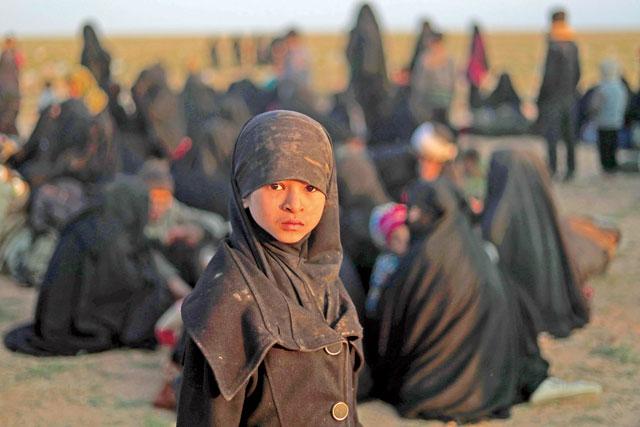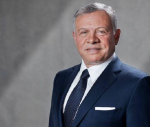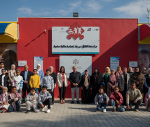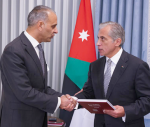You are here
Syria force screens and treats 'caliphate' survivors
By AFP - Feb 26,2019 - Last updated at Feb 26,2019
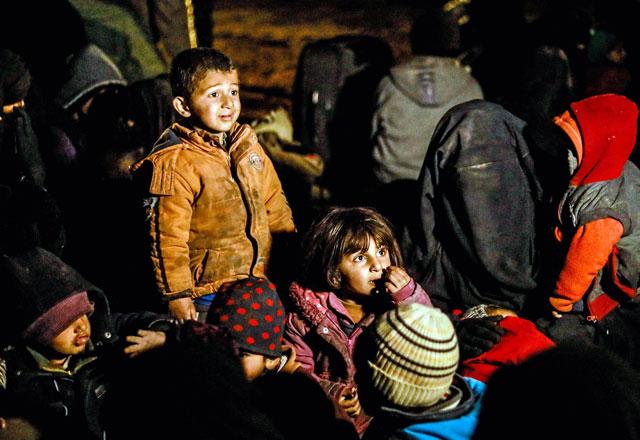
Women and children evacuated from the Daesh group's embattled holdout of Baghouz wait in a zone held by the US-backed Syrian Democratic Forces during an operation to expel Daesh extremists from the area, in the eastern Syrian province of Deir Ezzor, on Monday (AFP photo)
NEAR BAGHOUZ, Syria — US-backed forces in eastern Syria on Tuesday screened and treated truckloads of suspected extremists and relatives who left a village where the Daesh group's "caliphate" is making its last stand.
The Kurdish-led Syrian Democratic Forces (SDF) struggled to cope with the flow of people exiting the very last shred of a once-sprawling proto-state that claimed dominion over millions of people.
Several thousand of them are believed to remain in a last redoubt which has been shrunk to about half a square kilometre on the edge of Baghouz, a hamlet by the Euphrates River.
Hundreds of them, mostly women and children, arrived on Tuesday from Baghouz to a desert screening centre in a convoy of 11 huge double-trailer trucks.
The women formed a queue to be searched before heading to a distribution point where baby formula, diapers and bread were being handed out.
Overwhelmed fighters from the Kurdish-led SDF were still treating some of the more than 2,000 people who were trucked in the previous day.
An AFP reporter saw an 11-year-old girl who had lost her leg, a small child with a broken hand and his pregnant mother as well as others who had suffered wounds from landmine explosions and bombardment.
Kurdish fighters there said 30 people, mostly women, had already been sent on to other facilities for treatment, and that a total of 300 had received emergency care.
Their accounts of the makeshift camp in Baghouz where the SDF says around 5,000 people remain describe a death trap of disease and starvation.
'Nothing but hunger'
Many of the women told AFP they were not able to leave earlier for lack of funds to pay the smugglers who spirit groups out of the besieged area.
“Inside, there is nothing but hunger,” said one of them.
Next to her, two famished, dust-caked children were spooning out jam from a pot with their grimy fingers.
Nearby in the chaotic SDF outpost, a woman from Kazakhstan was walking around asking people if they knew whether meals would be handed out soon.
The number of people trapped in the last Daesh pocket near the Iraqi border has exceeded all estimates from a month ago, when SDF forces looked poised to complete their takeover.
The SDF, which has spearheaded the fight against Daesh in Syria since 2015, has complained that the burden was too heavy and urged the world to scale up its humanitarian effort.
Many of the civilians and fighters emerging from the ruins of the Daesh “caliphate” are foreigners whose countries of origin are reluctant to repatriate.
According to the Syrian Observatory for Human Rights, a Britain-based monitor, around 50,000 people have quit the last Daesh pocket in the Euphrates Valley since December 2018.
Among them are up to 5,000 suspected Daesh members, while most of the rest are their relatives.
After being vetted, women, children and men not suspected of belonging to the extremist group are transported north to the Kurdish-run camp of Al Hol, while suspected extremists are sent to SDF-held detention centres.
More evacuations are likely in the coming days but SDF forces, with backing from the US-led coalition and its aerial might, are then expected to move in and flush out any diehard Daesh fighters.
Secret transfers?
Kurdish Foreign Affairs Official Abdel Karim Omar said on Monday that the SDF would announce the end of the Daesh proto-state “in the next few days”.
“But this does not mean that we have eliminated terrorism, which must be eradicated at the roots,” he said.
Beyond Baghouz, Daesh still has thousands of fighters and sleeper cells across several countries.
In Syria, it retains a presence in the vast Badia desert, and the militants have claimed deadly attacks in SDF-held territory.
Some Daesh members are believed to have paid their way into Syria’s northwestern Idlib region, which is mostly controlled by a rival jihadist group dominated by former Al Qaeda fighters.
A fully-fledged assault by Russian-backed regime forces there was staved off by a September truce deal under which Turkey was expected to ensure that militants stand down.
The agreement has been rattled by several flare-ups, the latest of which killed dozens of people, mostly government and allied fighters over the past three days, the observatory said.
The monitor also said on Monday that 1,400 people, mainly Daesh relatives, were secretly transported from orchards on the outskirts of Baghouz to neighbouring Iraq over the weekend.
Kurdish officials did not confirm the transfer, but denied the SDF was responsible.
Baghdad on Sunday said the SDF has transferred 280 Iraqi nationals accused of fighting alongside Daesh to Iraqi authorities.
Related Articles
NEAR BAGHOUZ, Syria — US-backed forces evacuated over 40 truckloads of people from the Daesh group's last Syria redoubt on Monday, as they s
NEAR BAGHOUZ, Syria — US-backed Syrian forces prepared for another outpouring of civilians and suspected militants Thursday from the remnant
NEAR BAGHOUZ, Syria — Extremist fighters made a desperate last stand in eastern Syria on Wednesday, while their wives and children fled the


